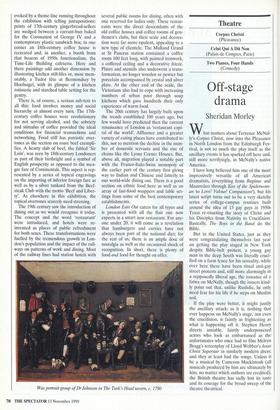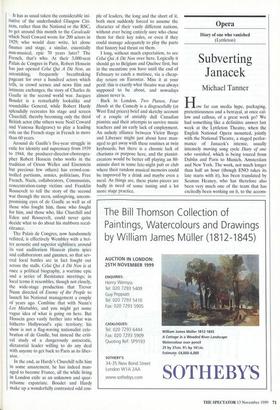Theatre
Corpus Christi (Pleasance)
Celui Qui A Dit Non (Palais de Congres, Paris)
Two Pianos, Four Hands (Comedy)
Off-stage drama
Sheridan Morley
What matters about Terrence McNal- ly's Corpus Christi, now into the Pleasance in North London from the Edinburgh Fes- tival, is not so much the play itself as the ancillary events it has sparked off here and, still more terrifyingly, in McNally's native America.
I have long believed him one of the most impressively versatile of all American dramatists, (everything from Ragtime and Masterclass through Kiss of the Spiderwom- an to Love! Valour! Compassion!), but his latest script turns out to be a very sketchy series of college-campus routines built around the idea of 13 gay guys in 1950s Texas re-enacting the story of Christ and his Disciples from Nativity to Crucifixion. Basically, The Boys in the Band do the Bible.
But in the United States, just as they were congratulating themselves last year on getting the play staged in New York despite Bible-belt protest, a young gay man in the deep South was literally cruci- fied on a farm fence for his sexuality, while over here there have been ritual anti-gay street protests and, still more alarmingly in a supposedly liberal age, the issuance of a fatwa on McNally, though the issuers kind- ly point out that, unlike Rushdie, he only need fear for his life if he steps on Muslim soil.
If the play were better, it might justify the ancillary attack; as it is, nothing that ever happens on McNally's stage, not even the crucifixion, is faintly as frightening as what is happening off it. Stephen Henry directs amiable, faintly underpowered actors who look as embarrassed as the unfortunates who once had to film Melvyn Bragg's screenplay of Lloyd Webber's Jesus Christ Superstar in similarly modern dress; and they at least had the songs. Unless it be a musical by Cameron Mackintosh (all musicals produced by him are ultimately by him, no matter which authors are credited), the British theatre has sadly lost its taste and its courage for the broad sweep of the theatre theatrical.
It has as usual taken the considerable ini- tiative of the underfunded Glasgow Citi- zens, rather than the National or the RSC, to get around this month to the Cavalcade which Noel Coward wrote for 200 actors in 1929; who would dare write, let alone finance and stage, a similar, essentially non-musical, epic 70 years later? The French, that's who. At their 3,000-seat Palais de Congres in Paris, Robert Hossein has just opened Celui Qui A Dit Non, an astonishing, frequently breathtaking Pageant for over a hundred actors which tells, in crowd scenes and news film and intimate exchanges, the story of Charles de Gaulle in the second world war. Jacques Boudet is a remarkably lookalike and soundalike General, while Robert Hardy splendidly recreates his stage and screen Churchill, thereby becoming only the third British actor (the others were Noel Coward and Vanessa Redgrave) to play a leading role on the French stage in French in more than 60 years.
Around de Gaulle's five-year struggle in exile for identity and supremacy from 1939 to 1944, the producer-director-choreogra- pher Robert Hossein (who works in the tradition of Orson Welles and Eisenstein but precious few others) has crowd-con- trolled partisans, armies, politicians, Free French, Nazis, collaborators, Communists, concentration-camp victims and Franklin Roosevelt to tell the story of the second war through the stern, unforgiving, uncom- promising eyes of de Gaulle as well as of those who fought him, those who fought for him, and those who, like Churchill and Eden and Roosevelt, could never quite decide what to do about his stubborn recal- citrance.
The Palais de Congres, now handsomely refitted, is effectively Wembley with a bet- ter acoustic and superior sightlines; around its vast auditorium Hossein plants spies and collaborators and gunmen, so that sev- eral local battles are in fact fought out across the stalls. Celui Qui A Dit Non is at once a political biography, a wartime epic and a series of Resistance meetings; in local terms it resembles, though not closely, the wide-stage production that Trevor Nunn directed of Enemy of the People to launch his National management a couple of years ago. Combine that with Nunn's Les Miserables, and you might get some vague idea of what is going on here. But Hossein goes vastly further into what was hitherto Hollywood's epic territory; his show is not a flag-waving nationalist cele- bration of de Gaulle, but instead the criti- cal study of a dangerously autocratic, dictatorial leader willing to do any deal with anyone to get back to Paris as its liber- ator.
In the end, as Hardy's Churchill tells him in some amazement, he has indeed man- aged to become France, all the while living in London exile as an unknown and quar- relsome expatriate. Boudet and Hardy make up a wonderfully contrasted odd cou ple of leaders, the long and the short of it, both men suddenly forced to assume the character of their vastly different nations, without ever being entirely sure who chose them for their key roles, or even if they could manage adequately to play the parts that history had thrust on them.
I long, without much expectation, to see Celui Qui A Dit Non over here. Logically it should go to Belgium and Quebec first, but in the meantime you have until the end of February to catch a matinee, via a cheap- day return on Eurostar. Miss it at your peril: this is exactly what theatre was always supposed to be about, and nowadays almost never is.
Back in London, Two Pianos, Four Hands at the Comedy is a disgracefully (at West End prices) brief and sketchy account of a couple of amiably dull Canadian pianists and their attempts to survive music teachers and an early lack of employment. An unholy alliance between Victor Borge and Liberace might just about have man- aged to get away with these routines at twin keyboards, but there is a chronic lack of charisma or purpose here, and the pianist- creators would be better off playing an 80- minute duet in some late-night pub or club where their random musical memoirs could be improved by a drink and maybe even a meal. As things are, these piano pieces are badly in need of some tuning and a lot more stage practice.



























































































 Previous page
Previous page